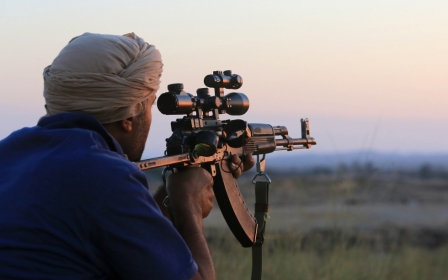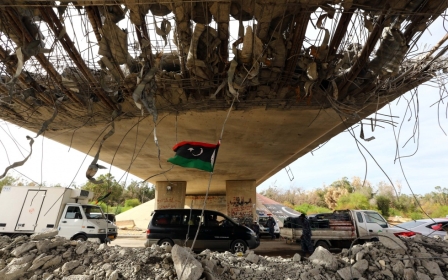UN threatens sanctions amid stalling Libya talks

The United Nations Security Council on Thursday threatened sanctions against those who reject UN-brokered peace talks in Libya.
UN special envoy Bernardino Leon held a first round of talks with rival politicians on 29 September that the council described as "an important step" toward a peaceful resolution in Libya - and something which the country's critical purse-holding central bank also welcomed this week.
But the Fajr Libya (Libya Dawn) militia that controls Tripoli has rejected the talks, and in the east, their ally "Shura of Benghazi Revolutionaries" issued their own statement rejecting the initiative as "unfair".
In a unanimous statement, the 15 members of the council "expressed their readiness to use targeted sanctions, including asset freezes and travel bans, against individuals or entities that threatened Libya's peace and stability or undermined its political transition."
Another round of talks is scheduled after the Eid al-Adha holiday, which ends Sunday evening.
The talks held in the remote town of Ghadames brought together members of Libya's House of Representatives (HoR) - one of two rivaling parliaments in the country now - with elected members of the same body who have boycotted the HoR sessions since the parliament was convened in August.
Around 80 Libyan politicians are currently boycotting the country's Tobruk-based government for a variety of reasons - some out of choice and some who are reportedly unable to reach Tobruk as a result of infrastructure destroyed during the past three years of fighting in the country.
"It's a mixed bag," said Mattia Toaldo, a visiting fellow at the European Council on Foreign Relations (ECFR), of the various boycotters this week. "You have people from Misrata. Islamists from all over. An Islamist MP from Benghazi. And then you have a bunch of people who can't get to Tobruk and who can't fly there."
Some analysts have indicated that the UN is likely focused on bringing the boycotting parliamentarians into the fold becuase they have connections to Libya Dawn and Misrata militias in control of Tripoli as well as the Tripoli-based General National Council, the HoR's rival which reestablished itself in August. In essence, the Ghadames talks are seen as a baby step towards future, broader reconciliation.
One of the sticking points for many of the boycotters has been the HoR's move to Tobruk when, by law, it should meet in Benghazi. The city, which has been at the centre of general Khalifa Haftar's so-called Operation Dignity.
If the HoR could, for example, decide on a neutral location to meet, Toaldo said, there is potential for boycotters to return and the country's transition - including elections scheduled for early next year - to get back on track.
Government representatives from Britain and Malta, Libya's close Mediterranean neighbour, attended the closed-door meeting in Ghadames, close to the border with Tunisia where many representatives are now based.
Dozens of Libyan troops killed in Benghazi
Meanwhile, dozens of soldiers were killed and more than 70 wounded in car bomb attacks and clashes between troops and militants around Benghazi airport, a Libyan army spokesman said Friday.
"Thirty-six soldiers were killed on Thursday in three car bomb attacks, followed by fighting between the army and Islamists", a special forces unit spokesman told AFP.
Two car bombs exploded when an army convoy travelled past close to the airport, taking out three soldiers, the spokesman said.
Later, a third bombing attack struck, also near the airport.
Islamist-led militias have since September sought to seize control of Benghazi airport -- the last remaining bastion in the city of forces loyal to former general Khalifa Haftar, a rogue general who launched a military campaign against the Islamists in May.
On Wednesday, militiamen of the Shura Revolutionary Council launched a fresh assault on the airport, which has both civilian and military airfields.
General Sagr al-Jerushi, an aide to Haftar, said warplanes and helicopters were being used to repulse the Islamists' advance on the airport.
Sudan summons Libyan envoy over 'interference' claims
Sudan has summoned Libya's chargé d'affaires to protest claims made by a Libyan army official that Khartoum was supporting Islamist militias in the North African country.
"Foreign Ministry Undersecretary Abdullah al-Azraq summoned the Libyan chargé d'affaires to officially deliver Sudan's objection on media remarks made by a Libyan army officer, in which he accused Sudan of supporting extremist groups in Libya," read a Thursday statement issued by the ministry.
"Sudan stands at the same distance from all sides in Libya and is ready to play a mediating role," the release said.
Last month, Libyan Prime Minister Abdullah al-Thani accused both Sudan and Qatar of arming the Islamist "Dawn of Libya" militia, threatening to sever ties with both countries if they continued to support the militia.
The political divisions have yielded two rival seats of government in the country, each of which has its own institutions.
Libya has been sliding into chaos since longtime dictator Muammar Gaddafi was toppled in an uprising that was later supported by NATO three years ago.
New MEE newsletter: Jerusalem Dispatch
Sign up to get the latest insights and analysis on Israel-Palestine, alongside Turkey Unpacked and other MEE newsletters
Middle East Eye delivers independent and unrivalled coverage and analysis of the Middle East, North Africa and beyond. To learn more about republishing this content and the associated fees, please fill out this form. More about MEE can be found here.



